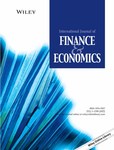In November of 2020, an economics professor wrote to the editor-in-chief of a journal with two requests: remove his name from an online paper on which he was the corresponding author, and retract the article.
More than two years later, neither of those things has happened.
Instead, the article, “Outward foreign direct investment and economic growth in Romania: Evidence from non-linear ARDL approach,” which appeared in August 2020 in the International Journal of Finance and Economics, was included in the January 2022 issue of the journal. It has been cited 10 times, according to Clarivate’s Web of Science.
A scholar who was involved in the work but left off the paper has provided evidence, seen by Retraction Watch, that the published article contains falsified data. Two of the paper’s authors also have had another article they co-authored together retracted.
Continue reading Two years ago, an author asked a journal to withdraw a paper. It still hasn’t.







